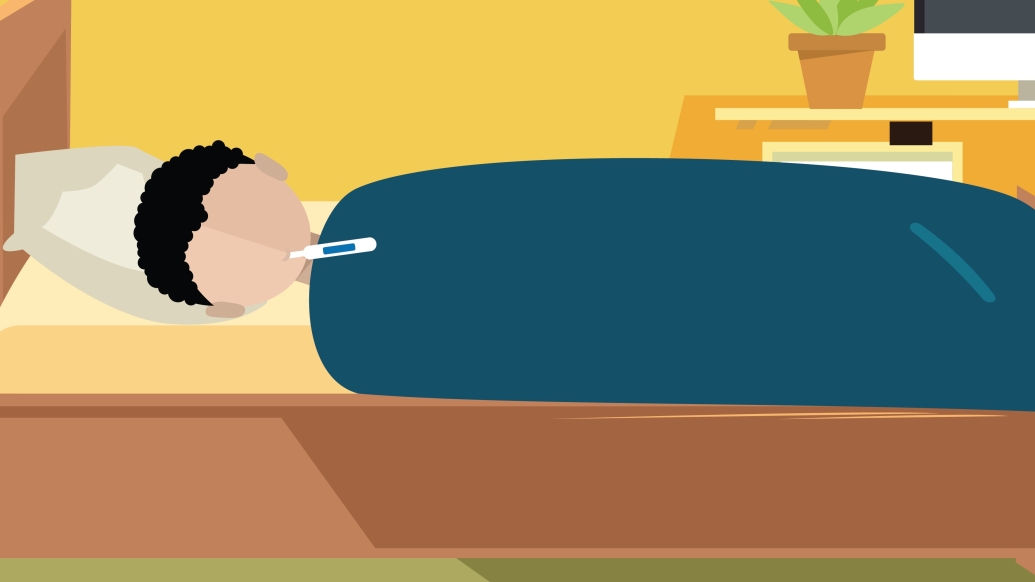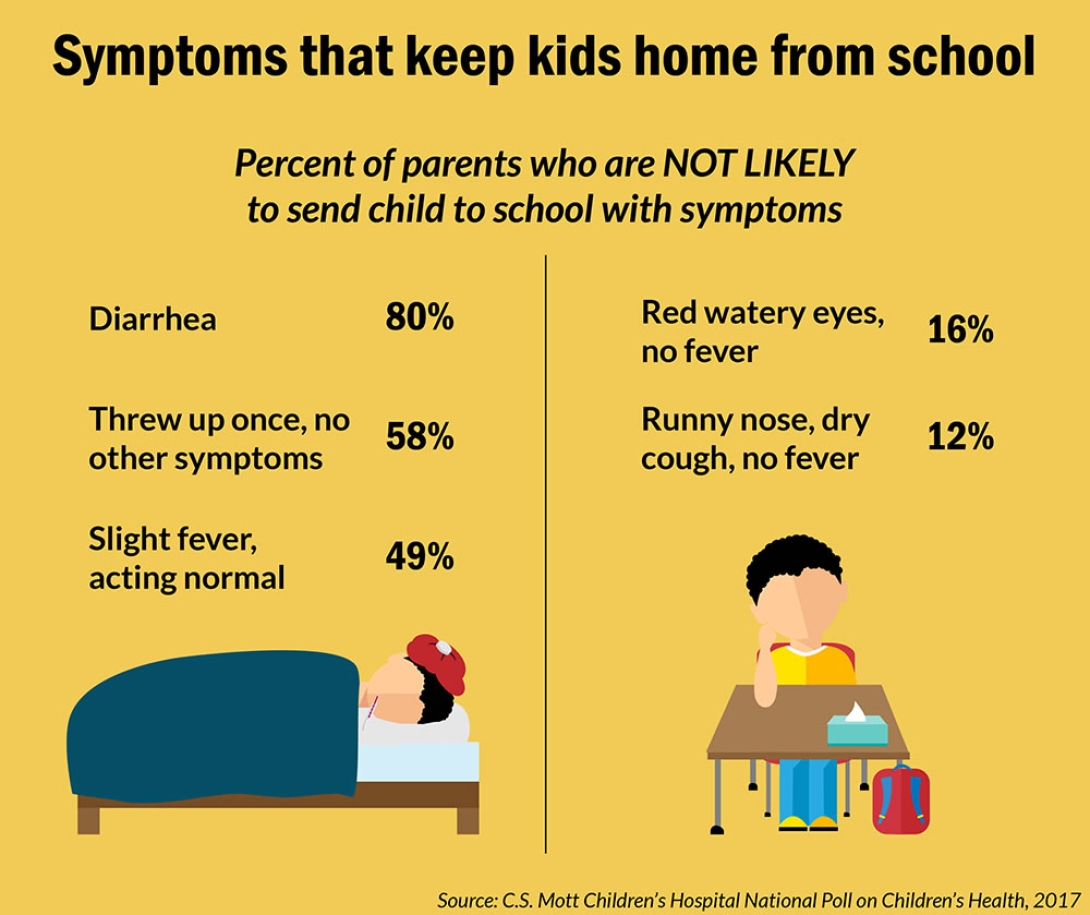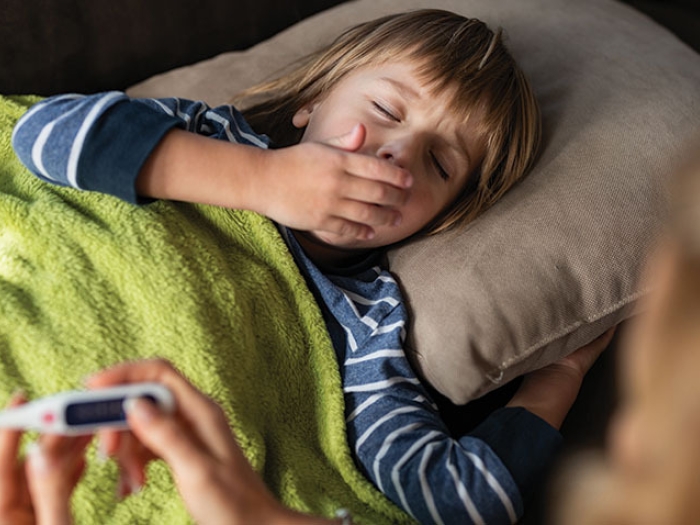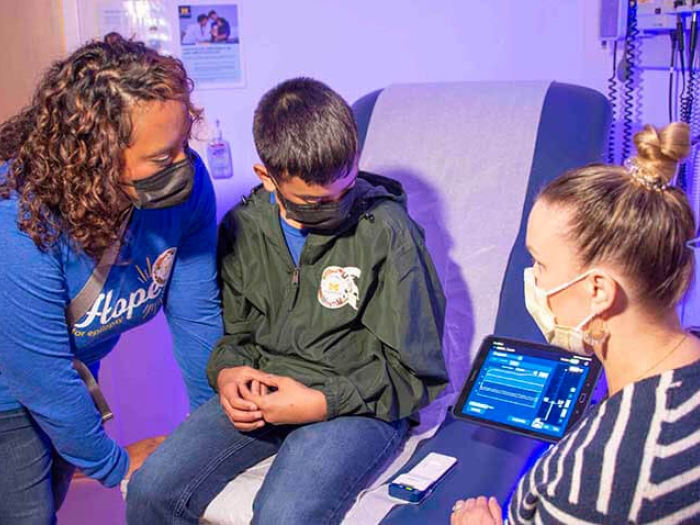Many parents aren’t sure when their kids should stay home sick or when it is OK to pack them off to school, tissues in tow, a new poll finds.
1:00 PM
Author |

It can be a nerve-wracking, game-time decision for parents: whether their sick child should stay home from school.
MORE FROM MICHIGAN: Sign up for our weekly newsletter
But opinions among parents differ when it comes to how sick is too sick, or the importance of sick-day consequences such as parents missing work or kids missing tests, according to a new national poll from the University of Michigan C.S. Mott Children's Hospital National Poll on Children's Health.
Seventy-five percent of parents report at least one sick day for their child in the past year. The top factors in parents deciding to keep a child home included concern that the illness would get worse or spread to classmates, according to today's nationally representative poll report.
Stay or go?
Parents of younger children (ages 6 to 9) most frequently rate health-related concerns as very important considerations in calling a sick day, while 2 in 5 parents of high schoolers place similar value on missing tests or falling behind in class work.
Symptoms also make a difference. Most parents (80 percent) are not likely to send a child to school with diarrhea, but there is less agreement about vomiting (58 percent) or a child having a slight fever but acting normally (49 percent). Few parents say they are not likely to send a child with red, watery eyes but no fever (16 percent) or a runny nose, dry cough and no fever (12 percent).
"Parents often have to make a judgment call about whether their child's sickness warrants staying home," says lead author and Mott poll co-director Gary Freed, M.D., M.P.H. "We found that the major considerations were whether attending school could negatively impact a child's health or the health of classmates."
Freed says parents may recognize that certain symptoms such as diarrhea and vomiting would significantly disrupt a child's school day. But most parents did not view familiar symptoms, such as a runny nose or dry cough without a fever, as serious enough to miss school.
"It can be difficult to predict if a child will feel worse after going to school or how long symptoms of minor illnesses will last, so parents are often basing decisions on their best guess," Freed says.
SEE ALSO: Turning Fleece Blankets into 'Armor' for Sick Kids
Logistics also influence the decision to keep a child home from school. Eleven percent of parents cite not wanting to miss work as very important, while 18 percent say not being able to find someone to stay home with their sick child is a very important factor. This is less of an issue as children get older, with 32 percent of parents allowing older children to stay home alone when sick.
Only 6 percent of parents say missing after-school activities is very important.
The report was based on responses from 1,442 parents who had at least one child ages 6 to 18.

What parents should know
Off to school or stay home? Doctors offer guidelines to consider if your child is sick.
-
A phone call or a visit to the child's health care provider can help you know whether the child has a serious illness, but it may not clarify how long symptoms will last.
-
Does your child have a runny nose? If the child is still in good spirits, playing and eating, send him or her to school with extra tissues. But if symptoms are accompanied by decreased appetite, lethargy, mood change or breathing difficulty, call the child's health care provider.
-
A spike in temperature does not always mean something serious. If children are attentive and playing, a school day probably won't hurt. But if the fever persists for more than three days or comes with other symptoms (such as listlessness or vomiting), keep the child home and consider calling a health care provider.
-
The cause of diarrhea and vomiting could range from a virus to food poisoning. If symptoms will disrupt the school day or are accompanied by pain or fever, or if the child is too young to manage symptoms (making trips to the bathroom or being conscious of handwashing, for example), keep your child home.
For more, read the full report here.

Explore a variety of healthcare news & stories by visiting the Health Lab home page for more articles.

Department of Communication at Michigan Medicine
Want top health & research news weekly? Sign up for Health Lab’s newsletters today!





